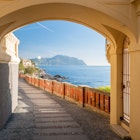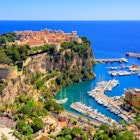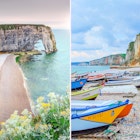
Getting around Nice is a breeze, whether you take the tram or walk the promenade
May 4, 2022 • 6 min read

Getting around in Nice is easy, whether you explore on foot, by tram, or by bus © Carol Yepes / Getty Images
Getting around Nice couldn’t be easier! This compact French city is very walkable and easily accessible by public transport, with plenty of eco-friendly ways to get around. Inexpensive fares and short travel times only add to the experience.
Even Nice’s airport – one of France’s biggest hubs, serving hundreds of national and international destinations daily – is located a mere 20 minutes from the city center by tram. So get ready to explore one of France’s most stunning seaside locations with our guide to transport in Nice.
Central Nice is best explored on foot
Nice is a great place to explore on foot. Nowhere is too far away, the weather is usually on your side (it’s more often sunny than not) and some areas – like the atmospheric old town – are fully pedestrianized. There’s also plenty to look at, from stunning architectural gems and colorful facades to cute cafés and quirky boutiques. The best way to find your favorite spots to eat and shop is on foot.
The best walk starts on the Promenade des Anglais
Start off with a stroll along the Promenade des Anglais, one of the most famous stretches of seafront in France, lined with iconic beaches, swaying palm trees and iconic landmarks. Next, climb the steps leading up to the Colline du Château for magnificent views, before making your way back down to the old town just below. Get lost in Vieux Nice’s narrow, winding streets and alleyways, which are packed with shops, restaurants, palaces and baroque churches that are all well worth a visit.
From there, it’s a short walk to the picturesque Place Masséna and the city center, where you can hit the stores along Avenue Jean-Médecin, take a break in Promenade du Paillon’s gorgeously landscaped park, or delve into modern and contemporary art at the Musée d’Art Moderne et d’Art Contemporain (MAMAC).

The tram is fast, cheap and sustainable and will get you almost anywhere
After walking, the tram is Nice’s next best mode of transport. Just hop on a tram from anywhere in central Nice for easy and quick access to top sights and spots, including the Avenue Jean-Médecin, the Place Masséna, Vieux Nice (Opéra Vieille Ville) and the Libération market.
Run by Lignes d’Azur – the same company that runs the city’s bus network – these electric trams are environmentally friendly, fast and cheap. You'll pay €1.50 a ride, €10 for 10 journeys, €5 for a 24-hour pass, or €15 for a 7-day pass.
Tram line 2 is the easiest way to reach the city from the airport
The first thing you should do when you get off the plane in Nice is hop onto the city’s sleek tram line 2, which will whisk you to the city center in about 20 minutes. The tram operates three lines connecting the airport, the port, the train station and the city center. Carriages are modern, air-conditioned and wheelchair-accessible, with regular services running daily from 4am till after midnight.
Hop on a bus to explore the outskirts of Nice
Also run by Lignes d’Azur, Nice’s extensive bus network is the best way to access and get around outlying neighborhoods such as the leafy Cimiez district, with its art museums, elegant villas, Roman ruins and famous monastery, or the hiking trails and sweeping vistas of the Parc du Mont Boron.
Buses on most routes run every 10 to 15 minutes from 6am to 10pm, with some night services available between 10pm and 1am. The same ticket types and fares apply as for trams, which means you can combine tram and bus journeys when traveling on the Lignes d’Azur network.

Nice is becoming more and more bike and scooter friendly
With the introduction of dedicated cycling lanes (including all along the seafront) and the introduction of electric bike and e-scooter schemes, Nice has become increasingly friendly to people who like to travel on two wheels.
Nice’s bikeshare system, Vélo Bleu, is a practical, cheap and scenic way to see the sights. The city has a fleet of 1300 bikes spread across 161 docking stations in Nice, Cagnes-sur-Mer and Saint-Laurent du Var. There’s a €1.50 subscription fee, the first 30 minutes are free, and thereafter, rides cost €2 per hour. You can also rent bikes and scooters, including electric ones, from Roller Station on the seafront.
Unless you’re pedaling along the seafront or using other dedicated bike lanes, you’ll be cycling alongside Nice's busy traffic. Remember that as an urban cyclist, the same rules that apply to cars apply to bikes – stop at stop signs, use your hands to give turn signals and ride with the traffic flow.
Rideshares are cheaper than Nice's pricy taxis
Getting around Nicefixed fare couldn’t be easier! This compact French city is very walkable and easily accessible by public transport, with plenty of eco-friendly ways to get around. Inexpensive fares and short travel times only add to the experience.
Getting around NiceUber couldn’t be easier! This compact French city is very walkable and easily accessible by public transport, with plenty of eco-friendly ways to get around. Inexpensive fares and short travel times only add to the experience.

Traveling to Nice by car is best avoided
Driving in Nice is best avoided. Car parks are sparse, street-parking spaces are hard to find (you'll see double-parked cars everywhere), and there are many one-way streets that can be very confusing for first-time visitors. If you're familiar with the city, however, or are looking to explore further afield along the Côte d'Azur, you can hire a car at the airport or at the main train station, where all the major car-rental brands have offices, including Avis, Budget, Enterprise, Europcar, Hertz and Sixt.
Accessible transport in Nice
Nice’s tram and bus network is the most accessible way to get around. All trams and most buses are equipped with a wheelchair lift or ramp and dedicated areas on-board for mobility devices and wheelchairs. Tactile guidance systems at bus and tram stops make it easier for the visually impaired to board.
The city’s Mobil’Azur service provides buses specially equipped for the disabled on request, and rides cost the same as regular buses (€1.50 a ride, or €10 for 10 journeys). For more information on accessible travel, check out Lonely Planet’s accessible travel resources.
Why I love walking around Nice
I love exploring Nice on foot for a chance to spot the little things – the pretty storefronts and colorful shutters of the old town; the local market traders enthusiastically selling their wares on the Cours Saleya; the children (and sometimes adults, too) playing in the water fountains on the Promenade du Paillon.
It’s good exercise too, and you can never get bored of strolling along the paved Promenade des Anglais, my favorite walk in Nice for the sunshine, the sea breeze, the water’s ever-changing hues of blue and turquoise, and the people jogging, walking or cycling past. Take a seat on one of Nice’s famous blue beach chairs lining the seafront and take it all in like a local!
You may also like:
14 places to go to enjoy the best of France
France’s 10 most stunning road trips
The 12 best beaches in France
Explore related stories



 SportsNavigating Paris during the Olympics: how to avoid transport fare increases and more
SportsNavigating Paris during the Olympics: how to avoid transport fare increases and moreJul 8, 2024 • 8 min read

 Tips & AdviceEverything you need to know about Nice before you hit the French Riviera
Tips & AdviceEverything you need to know about Nice before you hit the French RivieraJun 6, 2024 • 8 min read

 Sustainable TravelHow to get around France: from cycling to traversing by train
Sustainable TravelHow to get around France: from cycling to traversing by trainMay 18, 2024 • 7 min read


